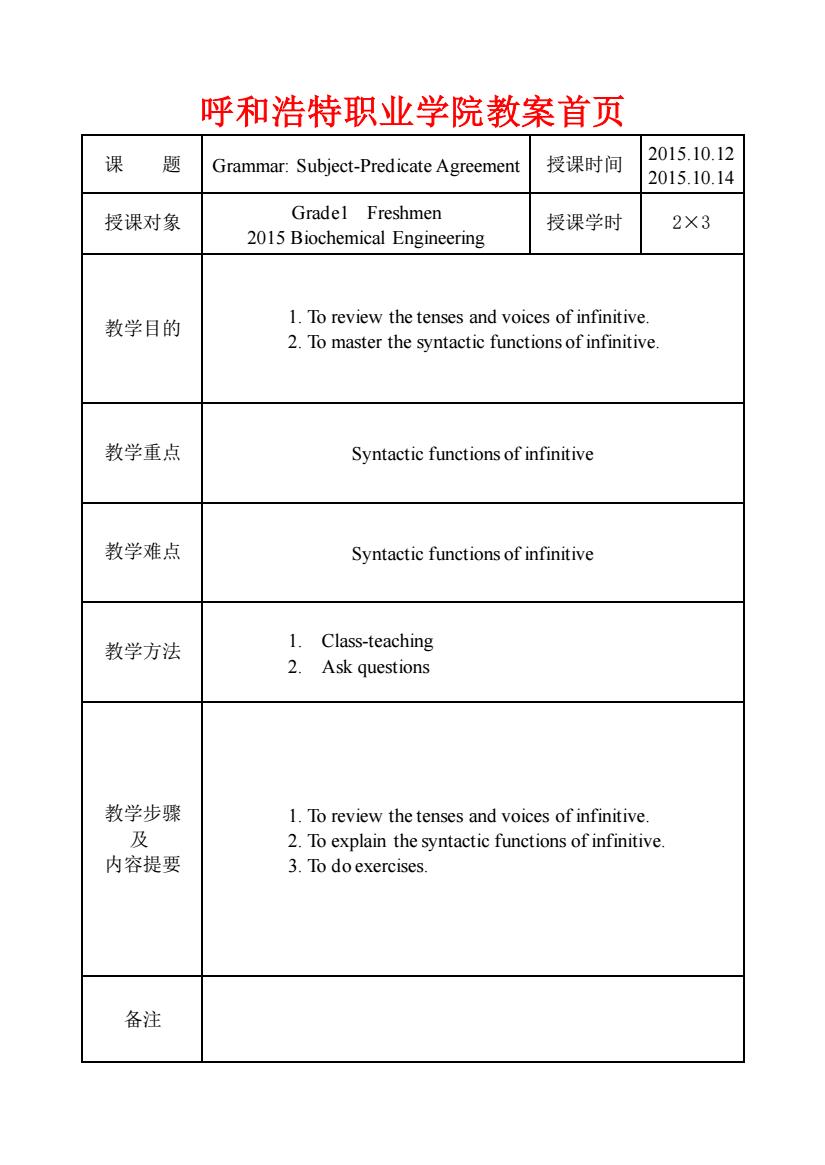
呼和浩特职业学院教案首页 课 题 授课时间 2015.10.12 Grammar:Subject-Predicate Agreement 2015.10.14 授课对象 Gradel Freshmen 授课学时 2×3 2015 Biochemical Engineering 教学目的 1.To review the tenses and voices of infinitive. 2.To master the syntactic functions of infinitive 教学重点 Syntactic functions of infinitive 教学难点 Syntactic functions of infinitive 教学方法 1. Class-teaching 2.Ask questions 教学步骤 1.To review the tenses and voices of infinitive 及 2.To explain the syntactic functions of infinitive. 内容提要 3.To doexercises. 备注
呼和浩特职业学院教案首页 课 题 Grammar: Subject-Predicate Agreement 授课时间 2015.10.12 2015.10.14 授课对象 Grade1 Freshmen 2015 Biochemical Engineering 授课学时 2×3 教学目的 1. To review the tenses and voices of infinitive. 2. To master the syntactic functions of infinitive. 教学重点 Syntactic functions of infinitive 教学难点 Syntactic functions of infinitive 教学方法 1. Class-teaching 2. Ask questions 教学步骤 及 内容提要 1. To review the tenses and voices of infinitive. 2. To explain the syntactic functions of infinitive. 3. To do exercises. 备注
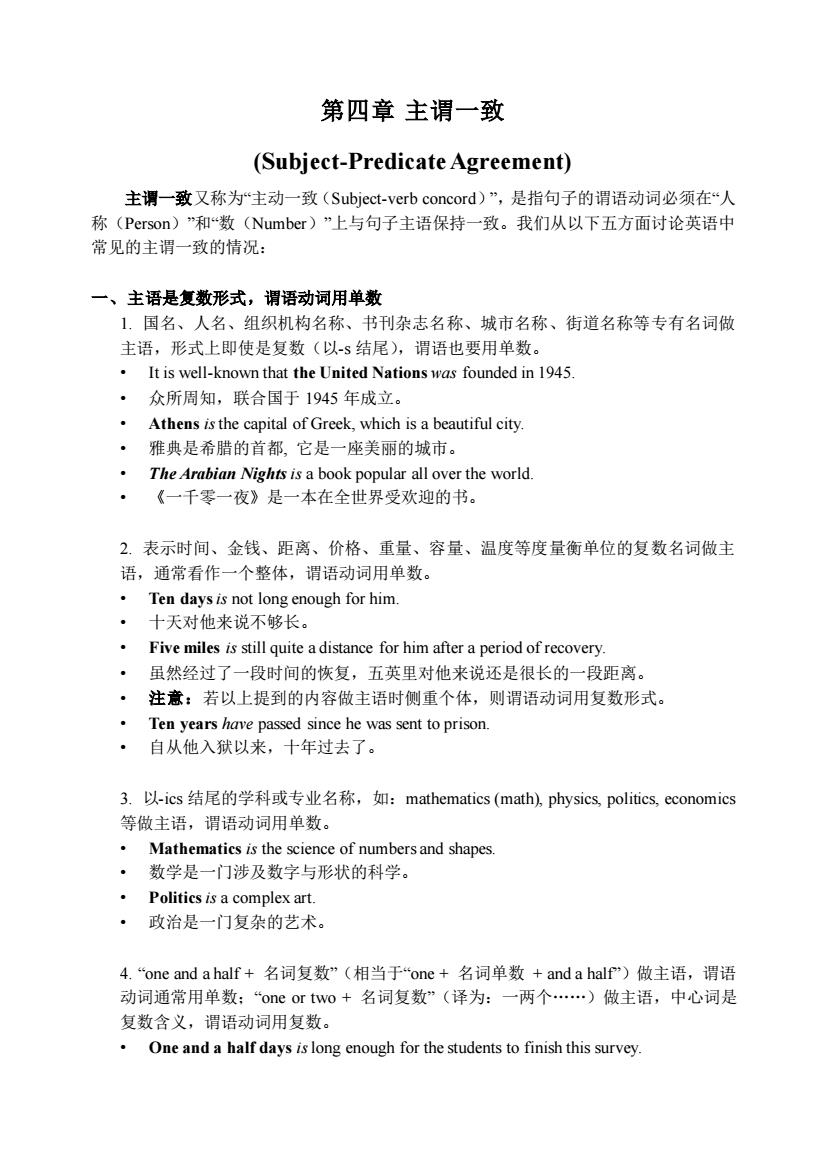
第四章主谓一致 (Subject-Predicate Agreement) 主谓一致又称为“主动一致(Subject-verb concord)”,是指句子的谓语动词必须在“人 称(Person)"和“数(Number)”上与句子主语保持一致。我们从以下五方面讨论英语中 常见的主谓一致的情况: 一、主语是复数形式,谓语动词用单数 1,国名、人名、组织机构名称、书刊杂志名称、城市名称、街道名称等专有名词做 主语,形式上即使是复数(以-s结尾),谓语也要用单数。 It is well-known that the United Nations was founded in 1945. 众所周知,联合国于1945年成立。 Athens is the capital of Greek,which is a beautiful city. 雅典是希腊的首都,它是一座美丽的城市。 The Arabian Nights is a book popular all over the world. 《一千零一夜》是一本在全世界受欢迎的书。 2.表示时间、金钱、距离、价格、重量、容量、温度等度量衡单位的复数名词做主 语,通常看作一个整体,谓语动词用单数。 Ten days is not long enough for him. ·十天对他来说不够长。 Five miles is still quite adistance for him after a period of recovery. 虽然经过了一段时间的恢复,五英里对他来说还是很长的一段距离。 ·注意:若以上提到的内容做主语时侧重个体,则谓语动词用复数形式。 Ten years have passed since he was sent to prison. ·自从他入狱以来,十年过去了。 3.以-ics结尾的学科或专业名称,如:mathematics(math),physics,politics,economics 等做主语,谓语动词用单数。 Mathematics is the science of numbers and shapes. ·数学是一门涉及数字与形状的科学。 .Polities is a complex art. ·政治是一门复杂的艺术。 4.“one and a half+名词复数”(相当于one+名词单数+and a half")做主语,谓语 动词通常用单数:“one or two+名词复数”(译为:一两个.)做主语,中心词是 复数含义,谓语动词用复数。 One and a half days is long enough for the students to finish this survey
第四章 主谓一致 (Subject-Predicate Agreement) 主谓一致又称为“主动一致(Subject-verb concord)”,是指句子的谓语动词必须在“人 称(Person)”和“数(Number)”上与句子主语保持一致。我们从以下五方面讨论英语中 常见的主谓一致的情况: 一、主语是复数形式,谓语动词用单数 1. 国名、人名、组织机构名称、书刊杂志名称、城市名称、街道名称等专有名词做 主语,形式上即使是复数(以-s 结尾),谓语也要用单数。 • It is well-known that the United Nations was founded in 1945. • 众所周知,联合国于 1945 年成立。 • Athens isthe capital of Greek, which is a beautiful city. • 雅典是希腊的首都, 它是一座美丽的城市。 • The Arabian Nights is a book popular all over the world. • 《一千零一夜》是一本在全世界受欢迎的书。 2. 表示时间、金钱、距离、价格、重量、容量、温度等度量衡单位的复数名词做主 语,通常看作一个整体,谓语动词用单数。 • Ten days is not long enough for him. • 十天对他来说不够长。 • Five miles is still quite a distance for him after a period of recovery. • 虽然经过了一段时间的恢复,五英里对他来说还是很长的一段距离。 • 注意:若以上提到的内容做主语时侧重个体,则谓语动词用复数形式。 • Ten years have passed since he was sent to prison. • 自从他入狱以来,十年过去了。 3. 以-ics 结尾的学科或专业名称,如:mathematics (math), physics, politics, economics 等做主语,谓语动词用单数。 • Mathematics is the science of numbers and shapes. • 数学是一门涉及数字与形状的科学。 • Politics is a complex art. • 政治是一门复杂的艺术。 4. “one and a half + 名词复数”(相当于“one + 名词单数 + and a half”)做主语,谓语 动词通常用单数;“one or two + 名词复数”(译为:一两个.)做主语,中心词是 复数含义,谓语动词用复数。 • One and a half days islong enough for the students to finish this survey
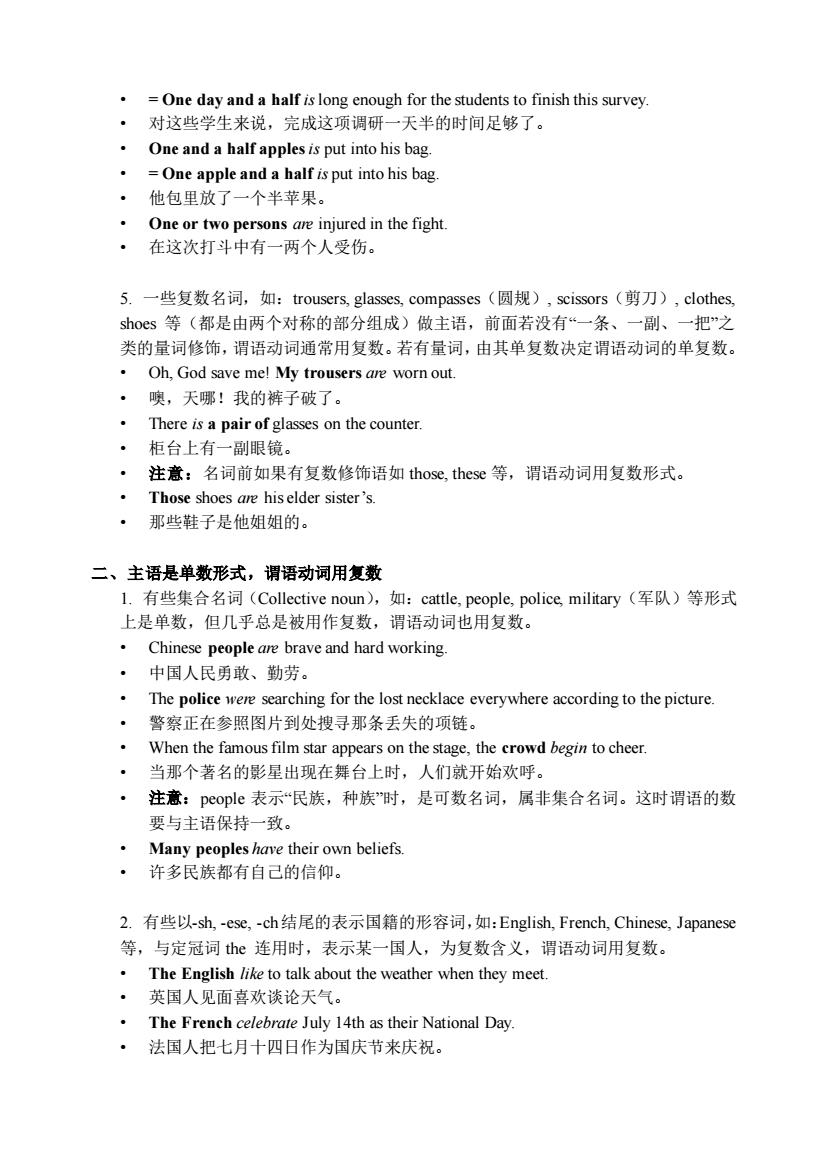
.=One day and a half is long enough for the students to finish this survey. ·对这些学生来说,完成这项调研一天半的时间足够了。 One and a half apples is put into his bag. =One apple and a half is put into his bag 他包里放了一个半苹果。 Oneor two persons are injured in the figh 在这次打斗中有一两个人受伤。 5.一些复数名词,如:trousers,glasses,compasses(圆规),scissors(剪刀),clothes. shos等(都是由两个对称的部分组成)做主语,前面若没有“一条、一副、一把之 类的量词修饰,谓语动词通常用复数。若有量词,由其单复数决定谓语动词的单复数。 Oh,God save me!My trousers are worn out ·噢,天哪!我的裤子破了。 There is a pair of glasses on the counter. 柜台上有一副眼镜。 注意:名词前如果有复数修饰语如those,.these等,谓语动词用复数形式。 Those shoes are his elder sister's. 那些鞋子是他姐姐的。 二、主语是单数形式,谓语动词用复数 L.有些集合名词(Collective noun,如:cattle,people,olcmilitary(军队)等形式 上是单数,但几乎总是被用作复数,谓语动词也用复数。 Chinese people are brave and hard working 中国人民勇敢、勤劳。 .The searching for the lost necklace everywhere according to the picture 警察正在参照图片到处搜寻那条丢失的项链。 When the famous film star appears on the stage,the erowd begin tocheer. 当那个著名的影星出现在舞台上时,人们就开始欢呼。 注意:people表示“民族,种族时,是可数名词,属非集合名词。这时谓语的数 要与主语保持一致。 Many peoples have their own beliefs ·许多民族都有自己的信仰。 2.有些以-sh,-ese,-ch结尾的表示国籍的形容词,如:English,French,Chinese,.Japanese 等,与定冠词th连用时,表示某一国人,为复数含义,谓语动词用复数。 The English like to talk about the weather when they meet. 英国人见面喜欢谈论天气。 The French celebrate July 14th as their National Day. 法国人把七月十四日作为国庆节来庆祝
• = One day and a half islong enough for the students to finish this survey. • 对这些学生来说,完成这项调研一天半的时间足够了。 • One and a half apples is put into his bag. • = One apple and a half is put into his bag. • 他包里放了一个半苹果。 • One or two persons are injured in the fight. • 在这次打斗中有一两个人受伤。 5. 一些复数名词,如:trousers, glasses, compasses(圆规), scissors(剪刀), clothes, shoes 等(都是由两个对称的部分组成)做主语,前面若没有“一条、一副、一把”之 类的量词修饰,谓语动词通常用复数。若有量词,由其单复数决定谓语动词的单复数。 • Oh, God save me! My trousers are worn out. • 噢,天哪!我的裤子破了。 • There is a pair of glasses on the counter. • 柜台上有一副眼镜。 • 注意:名词前如果有复数修饰语如 those, these 等,谓语动词用复数形式。 • Those shoes are his elder sister’s. • 那些鞋子是他姐姐的。 二、主语是单数形式,谓语动词用复数 1. 有些集合名词(Collective noun),如:cattle, people, police, military(军队)等形式 上是单数,但几乎总是被用作复数,谓语动词也用复数。 • Chinese people are brave and hard working. • 中国人民勇敢、勤劳。 • The police were searching for the lost necklace everywhere according to the picture. • 警察正在参照图片到处搜寻那条丢失的项链。 • When the famous film star appears on the stage, the crowd begin to cheer. • 当那个著名的影星出现在舞台上时,人们就开始欢呼。 • 注意:people 表示“民族,种族”时,是可数名词,属非集合名词。这时谓语的数 要与主语保持一致。 • Many peoples have their own beliefs. • 许多民族都有自己的信仰。 2. 有些以-sh, -ese, -ch结尾的表示国籍的形容词,如:English, French, Chinese, Japanese 等,与定冠词 the 连用时,表示某一国人,为复数含义,谓语动词用复数。 • The English like to talk about the weather when they meet. • 英国人见面喜欢谈论天气。 • The French celebrate July 14th as their National Day. • 法国人把七月十四日作为国庆节来庆祝

·注意:当这些词表示某种语言时,则转化为名词,一般用作单数,谓语动词也用 单数。 English is the language of Britain,the US,Australia and some other countries 英语是英国、美国、澳大利亚和其他一些国家的语言。 3.有些形容词,前面加上定冠词te表示一类人,其意义为复数,谓语动词也用复数。 有时甚至延伸到此类词的比较级与最高级形式中,如:the old,the young the living the wounded,the rich,the poor,the dead,the blind,the sick,the older,the oldest The old have splendid future behind them.The young have glorious future before them 。 老年人有辉煌的过去。年轻人有光辉灿烂的未来 The survival in the accident have been sent to hospital quickly 。 事故中的幸存者很快被送进了医院。 注意:如果此类形容词表示抽象事物做主语,则谓语动词用单数。 The bad in her oveneighs the good. 她身上的缺点多过优点。 三、主语是单数形式,谓语动词依具体情况而定 L.有些集合名词,如:family,clas,group,team,enemy,crowd,party,government,couple club,crew(全体人员),company(连队),public,audience,committee(委员会) population等做主语,分为两种情况:若作为一个整体,谓语动词用单数:若着眼于 组成该集体的每个成员或个体,谓语动词用复数。 The elass is in the charge of a beautiful girl. 一个漂亮的女孩负责这个班。 The class were taking notes in English when we passed by. 我们路过时,全班同学们正在用英语记笔记。 The committee have decided to accept the public advice. ·委员会委员们已决定接受公众的建议。 The committee is made up of seven members,including a doctor. ·委员会由七位成员组成,其中有一位医生。 After saying good-bye,the couple glimpsed each other and were lost in the crowd 互相道别后,夫妇两互相警了一眼,很快消失在人群中。 2.一些表示“部分概念”或“不定数量”的名词或代词做主语,形式上是单数,谓语动词 的单复数须依据of后面名词的单复数而定。如:half of,most of,the rest of,some of, none of等。 。 Half of the building is to be completed by the Spring Festiva ·在春节前这栋大楼将建成一半
• 注意:当这些词表示某种语言时,则转化为名词,一般用作单数,谓语动词也用 单数。 • English is the language of Britain, the US, Australia and some other countries. • 英语是英国、美国、澳大利亚和其他一些国家的语言。 3. 有些形容词,前面加上定冠词 the 表示一类人,其意义为复数,谓语动词也用复数。 有时甚至延伸到此类词的比较级与最高级形式中,如:the old, the young, the living, the wounded, the rich, the poor, the dead, the blind, the sick, the older, the oldest 等。 • The old have splendid future behind them. The young have glorious future before them. • 老年人有辉煌的过去。年轻人有光辉灿烂的未来。 • The survival in the accident have been sent to hospital quickly. • 事故中的幸存者很快被送进了医院。 • 注意:如果此类形容词表示抽象事物做主语,则谓语动词用单数。 • The bad in her overweighs the good. • 她身上的缺点多过优点。 三、主语是单数形式,谓语动词依具体情况而定 1. 有些集合名词,如:family, class, group, team, enemy, crowd, party, government, couple, club, crew(全体人员), company(连队), public, audience, committee(委员会), population 等做主语,分为两种情况:若作为一个整体,谓语动词用单数;若着眼于 组成该集体的每个成员或个体,谓语动词用复数。 • The class is in the charge of a beautiful girl. • 一个漂亮的女孩负责这个班。 • The class were taking notes in English when we passed by. • 我们路过时,全班同学们正在用英语记笔记。 • The committee have decided to accept the public advice. • 委员会委员们已决定接受公众的建议。 • The committee is made up of seven members, including a doctor. • 委员会由七位成员组成,其中有一位医生。 • After saying good-bye, the couple glimpsed each other and were lost in the crowd quickly. • 互相道别后,夫妇俩互相瞥了一眼,很快消失在人群中。 2. 一些表示“部分概念”或“不定数量”的名词或代词做主语,形式上是单数,谓语动词 的单复数须依据 of 后面名词的单复数而定。如:half of, most of, the rest of, some of, none of 等。 • Half of the building isto be completed by the Spring Festival. • 在春节前这栋大楼将建成一半
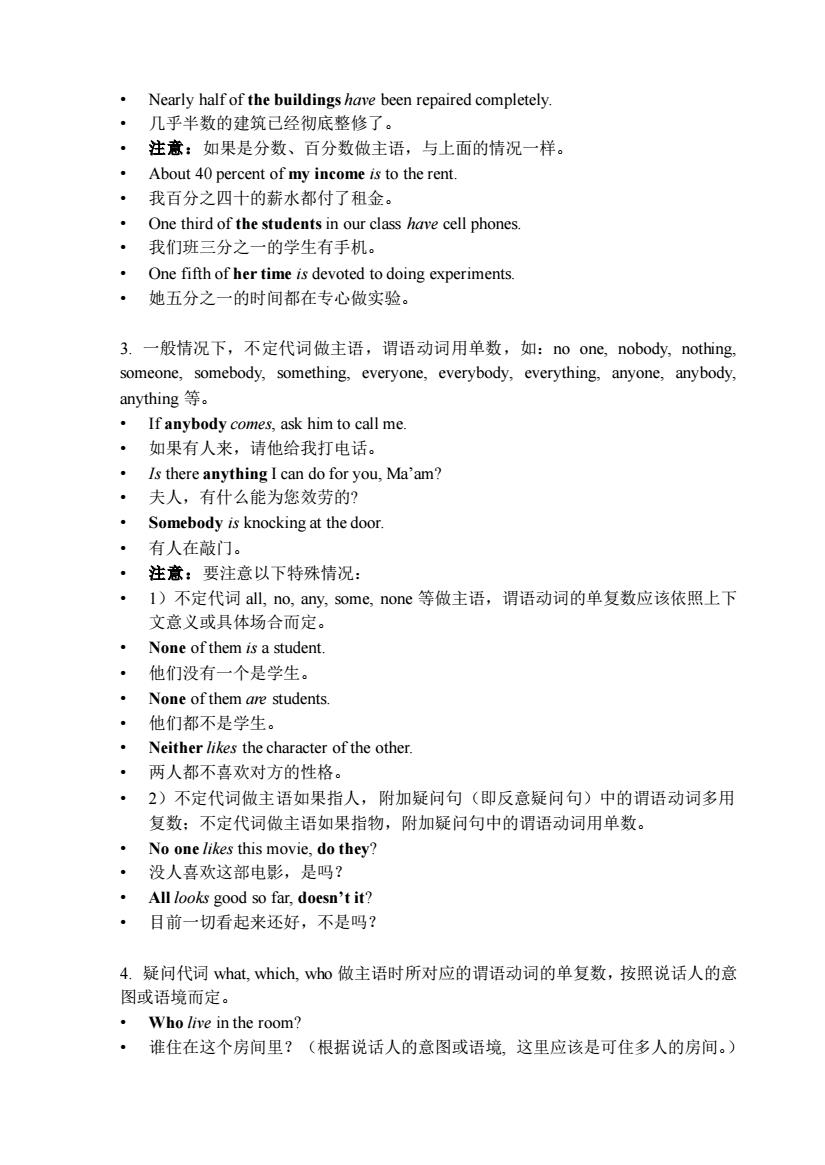
.Nearly half of the buildings have been repaired completely. ·几乎半数的建筑己经彻底整修了。 注意:如果是分数、百分数做主语,与上面的情况一样。 About 40 percent of my income is to the ren ·我百分之川十的薪水都付了用金。 One third of the students in our class have cell phones ·我们班三分之一的学生有手机 One fifth of her time is devoted to doing experiments ·地五分之一的时间都在专心做实哈。 3.一般情况下,不定代词做主语,谓语动词用单数,如:no one,nobody,nothing. someone,somebody,something.everyone,everybody,everything.anyone,anybody, anything等。 If anybody comes,ask him to call me. ·如果有人来,请他给我打电话。 Is there anything I can do for you,Ma'am? ·夫人,有什么能为您效劳的? Somebody is knocking at the door 有人在敲门。 注意:要注意以下特殊情况 ·I)不定代词al,no,any,some,none等做主语,谓语动词的单复数应该依照上下 文意义或具体场合而定。 None of them is a student 他们没有一个是学生。 None of then m are students 他们都不是学生。 Neither likes the cha acter of the other. 两人都不喜欢对方的性格。 2)不定代词做主语如果指人,附加疑问句(即反意疑问句)中的谓语动词多用 复数:不定代词做主语如果指物,附加疑问句中的谓语动词用单数。 No one likes this movie,do they? 没人喜欢这部电影,是吗? All looks good so far,doesn't it? ·目前一切看起来还好,不是吗? 4.疑问代词what,which,.who做主语时所对应的谓语动词的单复数,按照说话人的意 图或语境而定 ·Who live in the room? 谁住在这个房间里? (根据说话人的意图或语境,这里应该是可住多人的房间。》
• Nearly half of the buildings have been repaired completely. • 几乎半数的建筑已经彻底整修了。 • 注意:如果是分数、百分数做主语,与上面的情况一样。 • About 40 percent of my income is to the rent. • 我百分之四十的薪水都付了租金。 • One third of the students in our class have cell phones. • 我们班三分之一的学生有手机。 • One fifth of her time is devoted to doing experiments. • 她五分之一的时间都在专心做实验。 3. 一般情况下,不定代词做主语,谓语动词用单数,如:no one, nobody, nothing, someone, somebody, something, everyone, everybody, everything, anyone, anybody, anything 等。 • If anybody comes, ask him to call me. • 如果有人来,请他给我打电话。 • Is there anything I can do for you, Ma’am? • 夫人,有什么能为您效劳的? • Somebody is knocking at the door. • 有人在敲门。 • 注意:要注意以下特殊情况: • 1)不定代词 all, no, any, some, none 等做主语,谓语动词的单复数应该依照上下 文意义或具体场合而定。 • None of them is a student. • 他们没有一个是学生。 • None of them are students. • 他们都不是学生。 • Neither likes the character of the other. • 两人都不喜欢对方的性格。 • 2)不定代词做主语如果指人,附加疑问句(即反意疑问句)中的谓语动词多用 复数;不定代词做主语如果指物,附加疑问句中的谓语动词用单数。 • No one likes this movie, do they? • 没人喜欢这部电影,是吗? • All looks good so far, doesn’t it? • 目前一切看起来还好,不是吗? 4. 疑问代词 what, which, who 做主语时所对应的谓语动词的单复数,按照说话人的意 图或语境而定。 • Who live in the room? • 谁住在这个房间里?(根据说话人的意图或语境, 这里应该是可住多人的房间。)
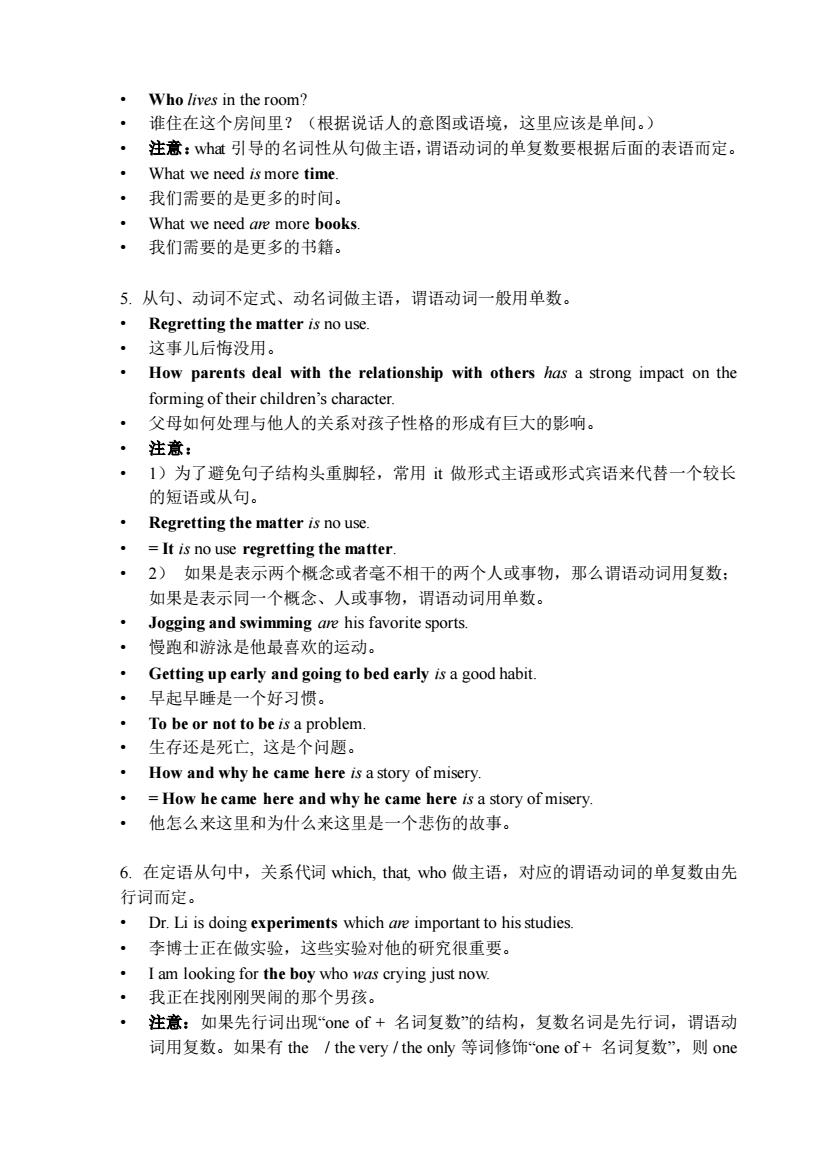
·Who lives in the room 谁住在这个房间里?(根据说话人的意图或语境,这里应该是单间。) 注意:wh引导的名词性从句做主语,谓语动词的单复数要根据后面的表语而定。 What we need is more time ·我们需要的是更多的时间。 What we need are more books ·我们需要的是更多的书籍。 5.从句、动词不定式、动名词做主语,谓语动词一般用单数。 Regretting the matter is no use. 这事儿后悔没用。 How parents deal with the relationship with others has a strong impact on the forming of their children's character 父母如何处理与他人的关系对孩子性格的形成有巨大的影响。 注意: ·1)为了避免句子结构头重脚轻,常用t做形式主语或形式宾语来代替一个较长 的短语或从句 Regretting the matter is no use. =It is no use regretting the matter ·2)如果是表示两个概念或者毫不相干的两个人或事物,那么谓语动词用复数: 如果是表示同一个概念、人或事物,谓语动词用单数。 Jogging and swimming are his favorite sports. 慢跑和游泳是他最喜欢的运动。 Getting up early and going to bed early is a good habit. 早起早睡是一个好习惯。 Tober nottobesaproblem 生存还是死亡,这是个问题。 How and why he came here is a story of misery .=How he came here and why he came here is a story of misery 他怎么来这里和为什么来这里是一个悲伤的故事。 6.在定语从句中,关系代词which,that,who做主语,对应的谓语动词的单复数由先 行词而定。 D.Li is doingexperiments which are important to his studies 李博士正在做实验,这些实验对他的研究很重要。 Iam looking for the boy who was crying just now. ·我正在找刚刚哭闹的那个男孩。 注意:如果先行词出现“ocof+名词复数"的结构,复数名词是先行词,谓语动 词用复数。如果有the /the very/the only等词修饰one of+名词复数”,则one
• Who lives in the room? • 谁住在这个房间里?(根据说话人的意图或语境,这里应该是单间。) • 注意:what 引导的名词性从句做主语,谓语动词的单复数要根据后面的表语而定。 • What we need is more time. • 我们需要的是更多的时间。 • What we need are more books. • 我们需要的是更多的书籍。 5. 从句、动词不定式、动名词做主语,谓语动词一般用单数。 • Regretting the matter is no use. • 这事儿后悔没用。 • How parents deal with the relationship with others has a strong impact on the forming of their children’s character. • 父母如何处理与他人的关系对孩子性格的形成有巨大的影响。 • 注意: • 1)为了避免句子结构头重脚轻,常用 it 做形式主语或形式宾语来代替一个较长 的短语或从句。 • Regretting the matter is no use. • = It is no use regretting the matter. • 2) 如果是表示两个概念或者毫不相干的两个人或事物,那么谓语动词用复数; 如果是表示同一个概念、人或事物,谓语动词用单数。 • Jogging and swimming are his favorite sports. • 慢跑和游泳是他最喜欢的运动。 • Getting up early and going to bed early is a good habit. • 早起早睡是一个好习惯。 • To be or not to be is a problem. • 生存还是死亡, 这是个问题。 • How and why he came here is a story of misery. • = How he came here and why he came here is a story of misery. • 他怎么来这里和为什么来这里是一个悲伤的故事。 6. 在定语从句中,关系代词 which, that, who 做主语,对应的谓语动词的单复数由先 行词而定。 • Dr. Li is doing experiments which are important to his studies. • 李博士正在做实验,这些实验对他的研究很重要。 • I am looking for the boy who was crying just now. • 我正在找刚刚哭闹的那个男孩。 • 注意:如果先行词出现“one of + 名词复数”的结构,复数名词是先行词,谓语动 词用复数。如果有 the / the very / the only 等词修饰“one of + 名词复数”,则 one
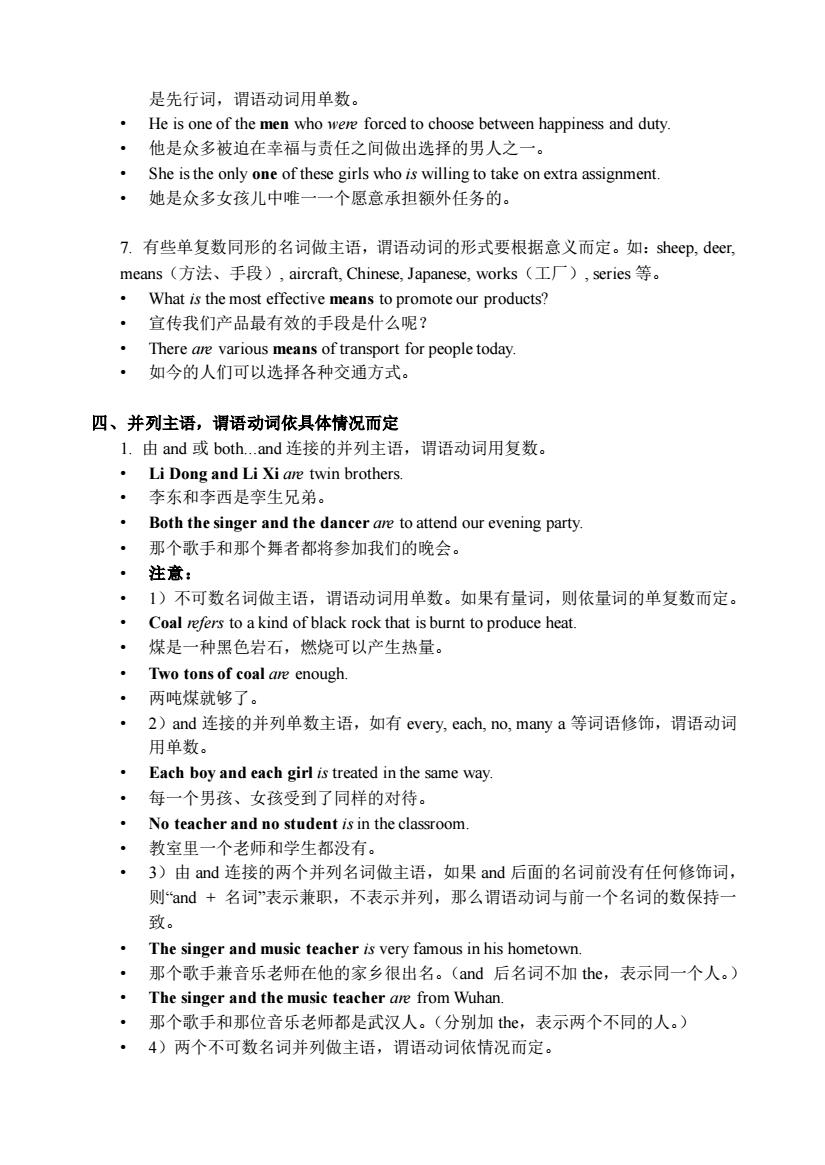
是先行词,谓语动词用单数。 .He is one of the men whowee forced to choose between happiness and duty. ·他是众多被迫在幸福与责任之间做出选择的男人之一。 She is the only one of these girls who is willing to take on extra assignmen ·她是众多女核儿中唯一一个愿意承担额外任务的。 7.有些单复数同形的名词做主语,谓语动词的形式要根据意义而定。如:sheep,deer, means(方法、手段),aircraft,Chinese,.Japanese,.works(工厂),series等 What is the most effective means to promote our products? 宣传我们产品最有效的手段是什么呢? There ave various means of transport for people today. 如今的人们可以选择各种交通方式。 四、并列主语,谓语动词依具体情况而定 1.由and或both.and连接的并列主语,谓语动词用复数。 Li Dong and Li Xi are twin brothers 李东和李西是李生兄弟。 Both the singer and the dancer are to attend our evening party. 那个歌手和那个舞者都将参加我们的晚会。 注意: ·1)不可数名词做主语,谓语动词用单数。如果有量词,则依量词的单复数而定。 Coal refers to a kind of black rock that is burnt to produce heat. 煤是一种黑色岩石,燃烧可以产生热量。 Two tons of coal are enough. 两吨煤就够了。 2)and连接的并列单数主语,如有every,each,no,.many a等词语修饰,谓语动词 用单数」 Each boy and each girl is treated in the same way. ·每一个男孩、女孩受到了同样的对待。 No teacher and no student is in the classroom. 教室里一个老师和学生都没有 ·3)由and连接的两个并列名词做主语,如果and后面的名词前没有任何修饰词, 则“ad+名词”表示兼职,不表示并列,那么谓语动词与前一个名词的数保持一 致。 The singer and music teacher is very famous in his hometown. ·那个歌手兼音乐老师在他的家乡很出名。(and后名词不加the,表示同一个人。) The singer and the music teacher are from Wuhan. ·那个歌手和那位音乐老师都是武汉人。(分别加th,表示两个不同的人。) 4)两个不可数名词并列做主语,谓语动词依情况而定
是先行词,谓语动词用单数。 • He is one of the men who were forced to choose between happiness and duty. • 他是众多被迫在幸福与责任之间做出选择的男人之一。 • She is the only one of these girls who is willing to take on extra assignment. • 她是众多女孩儿中唯一一个愿意承担额外任务的。 7. 有些单复数同形的名词做主语,谓语动词的形式要根据意义而定。如:sheep, deer, means(方法、手段), aircraft, Chinese, Japanese, works(工厂), series 等。 • What is the most effective means to promote our products? • 宣传我们产品最有效的手段是什么呢? • There are various means of transport for people today. • 如今的人们可以选择各种交通方式。 四、并列主语,谓语动词依具体情况而定 1. 由 and 或 both.and 连接的并列主语,谓语动词用复数。 • Li Dong and Li Xi are twin brothers. • 李东和李西是孪生兄弟。 • Both the singer and the dancer are to attend our evening party. • 那个歌手和那个舞者都将参加我们的晚会。 • 注意: • 1)不可数名词做主语,谓语动词用单数。如果有量词,则依量词的单复数而定。 • Coal refers to a kind of black rock that is burnt to produce heat. • 煤是一种黑色岩石,燃烧可以产生热量。 • Two tons of coal are enough. • 两吨煤就够了。 • 2)and 连接的并列单数主语,如有 every, each, no, many a 等词语修饰,谓语动词 用单数。 • Each boy and each girl is treated in the same way. • 每一个男孩、女孩受到了同样的对待。 • No teacher and no student is in the classroom. • 教室里一个老师和学生都没有。 • 3)由 and 连接的两个并列名词做主语,如果 and 后面的名词前没有任何修饰词, 则“and + 名词”表示兼职,不表示并列,那么谓语动词与前一个名词的数保持一 致。 • The singer and music teacher is very famous in his hometown. • 那个歌手兼音乐老师在他的家乡很出名。(and 后名词不加 the,表示同一个人。) • The singer and the music teacher are from Wuhan. • 那个歌手和那位音乐老师都是武汉人。(分别加 the,表示两个不同的人。) • 4)两个不可数名词并列做主语,谓语动词依情况而定
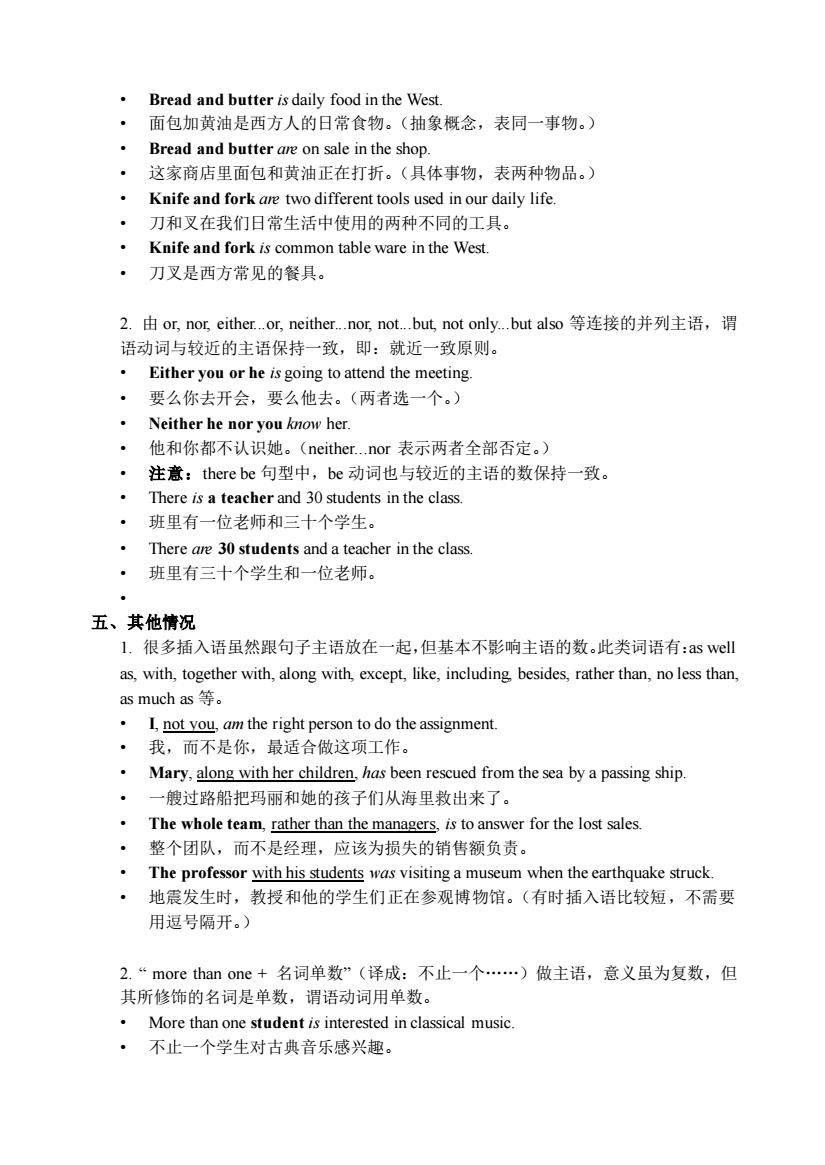
Bread and butter is daily food in the west 面包加黄油是西方人的日常食物。(抽象概念,表同一事物。) Bread and butter are on sale in the shop. 这家商店里面包和黄油正在打折。(具体事物,表两种物品。) Knife and fork are two different tools used in our daily life. 刀和叉在我们日常生活中使用的两种不同的工具。 Knife and fork is common table ware in the West. ·刀叉是西方常见的餐具。 2.由or,nor,either.or,neither.nor,not.but,not only.but also等连接的并列主语,谓 语动词与较近的主语保持一致,即:就近一致原则。 Either you or he is going to attend the meeting. ·要么你去开会,要么他去。(两者选一个。) Neither he nor you know her. 他和你都不认识她。(neither.nor表示两者全部否定。) ·注意:there be句型中,be动词也与较近的主语的数保持一致。 There is a teacher and 30students in the class ·班里有一位老师和三十个学生。 There are 30 students and a teacher in the class ·班里有三十个学生和一位老师。 五、其他情况 1.很多插入语虽然跟句子主语放在一起,但基本不影响主语的数。此类词语有:asw© as,with,together with,along with,except,like,including besides,rather than,no less than as much as等。 ·I.not you,am the right erson to do the assignment 我,而不是你,最适合做这项工作。 .Mary.along with her children,has been rescued from the sea by a passing ship. 一艘过路船把玛丽和她的孩子们从海里数出来了。 The whole team,rather than the managers,is to answer for the lost sales 整个团队,而不是经理,应该为损失的销售额负贵。 .The professor with his students was visiting a museum when the earthquake struck 地震发生时,教授和他的学生们正在参观博物馆。(有时插入语比较短,不需要 用逗号隔开。) 2.“more than one+名词单数”(译成:不止一个.)做主语,意义虽为复数,但 其所修饰的名词是单数,谓语动词用单数。 More than one student is interested in classical music ·不止一个学生对古典音乐感兴趣
• Bread and butter is daily food in the West. • 面包加黄油是西方人的日常食物。(抽象概念,表同一事物。) • Bread and butter are on sale in the shop. • 这家商店里面包和黄油正在打折。(具体事物,表两种物品。) • Knife and fork are two different tools used in our daily life. • 刀和叉在我们日常生活中使用的两种不同的工具。 • Knife and fork is common table ware in the West. • 刀叉是西方常见的餐具。 2. 由 or, nor, either.or, neither.nor, not.but, not only.but also 等连接的并列主语,谓 语动词与较近的主语保持一致,即:就近一致原则。 • Either you or he is going to attend the meeting. • 要么你去开会,要么他去。(两者选一个。) • Neither he nor you know her. • 他和你都不认识她。(neither.nor 表示两者全部否定。) • 注意:there be 句型中,be 动词也与较近的主语的数保持一致。 • There is a teacher and 30 students in the class. • 班里有一位老师和三十个学生。 • There are 30 students and a teacher in the class. • 班里有三十个学生和一位老师。 • 五、其他情况 1. 很多插入语虽然跟句子主语放在一起,但基本不影响主语的数。此类词语有:as well as, with, together with, along with, except, like, including, besides, rather than, no less than, as much as 等。 • I, not you, am the right person to do the assignment. • 我,而不是你,最适合做这项工作。 • Mary, along with her children, has been rescued from the sea by a passing ship. • 一艘过路船把玛丽和她的孩子们从海里救出来了。 • The whole team, rather than the managers, is to answer for the lost sales. • 整个团队,而不是经理,应该为损失的销售额负责。 • The professor with his students was visiting a museum when the earthquake struck. • 地震发生时,教授和他的学生们正在参观博物馆。(有时插入语比较短,不需要 用逗号隔开。) 2. “ more than one + 名词单数”(译成:不止一个.)做主语,意义虽为复数,但 其所修饰的名词是单数,谓语动词用单数。 • More than one student is interested in classical music. • 不止一个学生对古典音乐感兴趣

.Each student has got a LONGMAN Dictionary of Contemporary English. =The students each have got a LONGMAN Dictionary of Contemporary English .=The students have got a LONGMAN Dictionary of Contemporary English each. =Each of the students has got a LONGMAN Dictionary of Contemporary English. 里cch为主语) 学生们人手一本《朗文当代高级英语辞典》 3.ach做同位语起加强语气的作用,不影响句子主语的数。其位置比较灵活,可以是 “cach+名词单数+谓语动词单数”或“复数主语后或句尾+cach”。但是“each of+ 名词复数”做主语,这里的中心词是each,谓语动词用单数, 4.由kid引起的一系列词组,以kid作为句子的中心词,谓语动词受其数的限制, 而且介词of后面的名词前不加冠词。 ahe/this kind of books/bamboo+谓语动词单数,表示“一种”。 many/all kinds of books/bamboo+谓语动词复数,表示“多种多样”。 some kind of books/bamboo+谓语动词单数,表示“某种”。 some kinds of books/bamboo+谓语动词复数,表示“几种”。 5.句子中表示“许多、大量”意义的词语出现在主语中时: (1)“a great/large number of+名词复数+谓语动词复数”,表示“许多、大 量.”:而the number of+名词复数+谓语动词单数”,表示“.的数量”。 The number of experts invited was ten. 被邀请的专家有十人。 A number of students were absent for the rainstorm 有许多学生由于暴风雨缺席 (2)“lots of/plenty of+名词(可数名词复数、不可数名词均可)”做主语,谓 语动词的数与名词的数保持一致。 Plenty of students are waiting in line in order to buy the tickets. 。 好多学生在排队等候买票。 (3)“many a+单数名词”做主语,谓语动词用单数。 Many a teacher has received the invitation. ·许多老师都收到了激请函。 (4)“a great/good many+名词复数”做主语,谓语动词用复数 A great many books are on science research. 许多书是关于科学探索方面的。 (5)“a large/huge amount of+不可数名词”做主语,谓语动词用单数:“large/hugc amounts of+不可数名词”做主语,谓语动词用复数。 A large amount of work has been finished since he came back. =Large amounts of work have been finished since he came back
• Each student has got a LONGMAN Dictionary of Contemporary English. • = The students each have got a LONGMAN Dictionary of Contemporary English. • = The students have got a LONGMAN Dictionary of Contemporary English each. • = Each of the students has got a LONGMAN Dictionary of Contemporary English.(这 里 each 为主语) • 学生们人手一本《朗文当代高级英语辞典》。 3. each 做同位语起加强语气的作用,不影响句子主语的数。其位置比较灵活,可以是 “each + 名词单数 + 谓语动词单数”或“复数主语后或句尾 + each”。但是“each of + 名词复数”做主语,这里的中心词是 each,谓语动词用单数。 4. 由 kind 引起的一系列词组,以 kind 作为句子的中心词,谓语动词受其数的限制, 而且介词 of 后面的名词前不加冠词。 • a/the/this kind of books/bamboo + 谓语动词单数,表示“一种”。 • many/all kinds of books/bamboo + 谓语动词复数,表示“多种多样”。 • some kind of books/bamboo + 谓语动词单数,表示“某种”。 • some kinds of books/bamboo + 谓语动词复数,表示“几种”。 5. 句子中表示“许多、大量”意义的词语出现在主语中时: • (1)“a great/large number of + 名词复数 + 谓语动词复数”,表示“许多、大 量.”;而“the number of + 名词复数 + 谓语动词单数”,表示“.的数量”。 • The number of experts invited was ten. • 被邀请的专家有十人。 • A number of students were absent for the rainstorm. • 有许多学生由于暴风雨缺席。 • (2)“lots of / plenty of + 名词(可数名词复数、不可数名词均可)”做主语,谓 语动词的数与名词的数保持一致。 • Plenty of students are waiting in line in order to buy the tickets. • 好多学生在排队等候买票。 • (3)“many a + 单数名词”做主语,谓语动词用单数。 • Many a teacher has received the invitation. • 许多老师都收到了邀请函。 • (4)“a great/good many + 名词复数”做主语,谓语动词用复数。 • A great many books are on science research. • 许多书是关于科学探索方面的。 • (5)“a large/huge amount of + 不可数名词”做主语,谓语动词用单数;“large/huge amounts of + 不可数名词”做主语,谓语动词用复数。 • A large amount of work has been finished since he came back. • = Large amounts of work have been finished since he came back
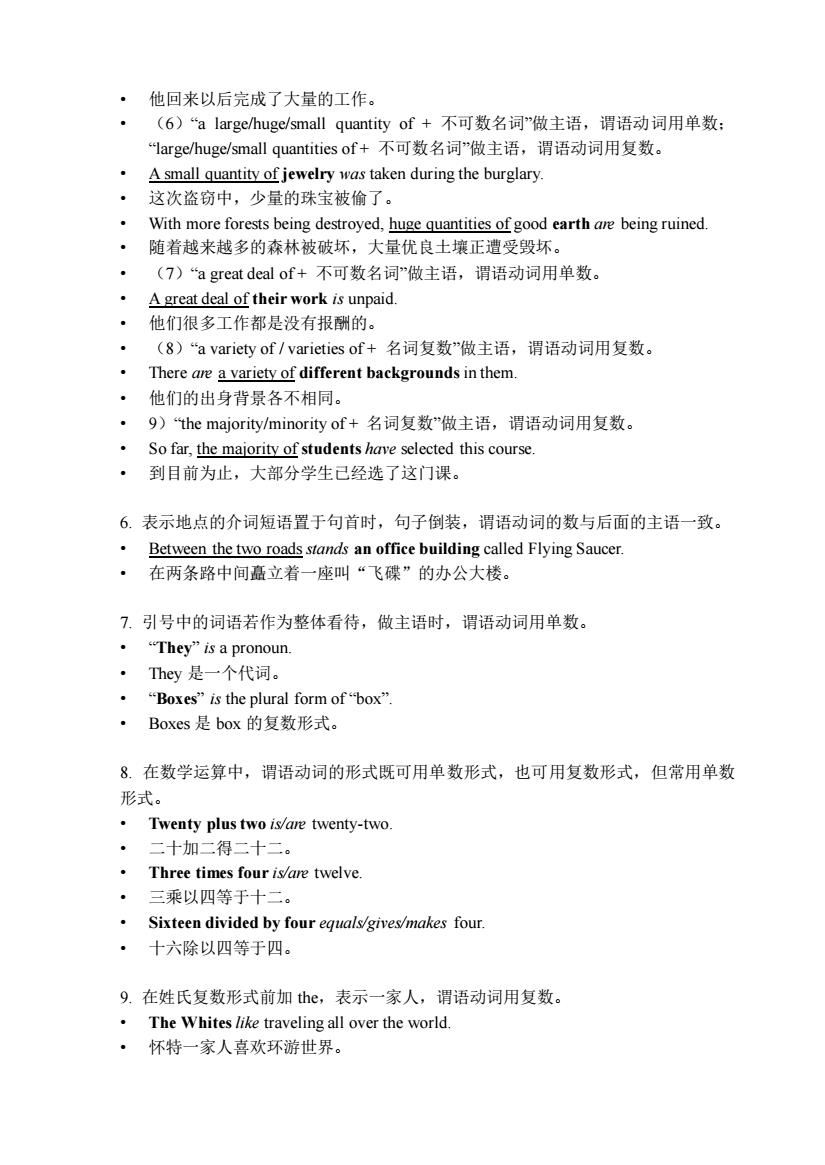
·他回米以后完成了大量的工作。 (6)“a large/huge/small quantity of+不可数名词做主语,谓语动词用单数: “large/huge/small quantities of+不可数名词做主语,谓语动词用复数。 A small quantity of jewelry was taken during the burglary. 这次盗窃中,少量的珠宝被偷了。 .With more forests being destroyed,huge quantities of good earth are being ruined. 随着越来越多的森林被破坏,大量优良土壤正遭受毁坏。 (7)“a可eat deal of+不可数名词”做主语,谓语动词用单数 A great deal of their work is unpaid 他们很多工作都是没有报酬的。 (8)a variety of/varieties of+名词复数”做主语,谓语动词用复数 There are a variety of different backgrounds in them. 他们的出身背景各不相同。 ·9)the majority/minority of+名词复数做主语,谓语动词用复数。 So far,the majority of students have selected this course ·到目前为止,大部分学生已经选了这门课。 6.表示地点的介词短语置于句首时,句子倒装,谓语动词的数与后面的主语一致。 Between the two roads stands an office building called Flying Saucer. ·在两条路中间矗立着一座叫“飞碟”的办公大楼。 7.引号中的词语若作为整体看待,做主语时,谓语动词用单数。 “They”is a pronoun. ·They是一个代词。 ·Boxes”is the plural form of"box'” ·Boxes是box的复数形式。 8.在数学运算中,谓语动词的形式既可用单数形式,也可用复数形式,但常用单数 形式。 Twenty plus two is/are twenty-two 二十加二得二十二。 Three times four is/are twelve 三乘以四等于十二。 Sixteen divided by four equals/gives/makes four 十六除以四等千四。 9.在姓氏复数形式前加the,表示一家人,谓语动词用复数。 .The Whites like traveling all over the world ·怀特一家人喜欢环游世界
• 他回来以后完成了大量的工作。 • (6)“a large/huge/small quantity of + 不可数名词”做主语,谓语动词用单数; “large/huge/small quantities of + 不可数名词”做主语,谓语动词用复数。 • A small quantity of jewelry was taken during the burglary. • 这次盗窃中,少量的珠宝被偷了。 • With more forests being destroyed, huge quantities of good earth are being ruined. • 随着越来越多的森林被破坏,大量优良土壤正遭受毁坏。 • (7)“a great deal of + 不可数名词”做主语,谓语动词用单数。 • A great deal of their work is unpaid. • 他们很多工作都是没有报酬的。 • (8)“a variety of / varieties of + 名词复数”做主语,谓语动词用复数。 • There are a variety of different backgrounds in them. • 他们的出身背景各不相同。 • 9)“the majority/minority of + 名词复数”做主语,谓语动词用复数。 • So far, the majority of students have selected this course. • 到目前为止,大部分学生已经选了这门课。 6. 表示地点的介词短语置于句首时,句子倒装,谓语动词的数与后面的主语一致。 • Between the two roads stands an office building called Flying Saucer. • 在两条路中间矗立着一座叫“飞碟”的办公大楼。 7. 引号中的词语若作为整体看待,做主语时,谓语动词用单数。 • “They” is a pronoun. • They 是一个代词。 • “Boxes” is the plural form of “box”. • Boxes 是 box 的复数形式。 8. 在数学运算中,谓语动词的形式既可用单数形式,也可用复数形式,但常用单数 形式。 • Twenty plus two is/are twenty-two. • 二十加二得二十二。 • Three times four is/are twelve. • 三乘以四等于十二。 • Sixteen divided by four equals/gives/makes four. • 十六除以四等于四。 9. 在姓氏复数形式前加 the,表示一家人,谓语动词用复数。 • The Whites like traveling all over the world. • 怀特一家人喜欢环游世界